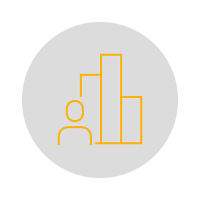PROGRAMME HIGHLIGHTS

International Curriculum |

Career Opportunities |

Experienced Faculty |

High Employability |
PROGRAMME DETAILS
- To provide a comprehensive theoretical and technical foundation in accounting, auditing and allied subject groups as practiced today
- To produce graduates with the skills and confidence required to undertake entry level accounting positions and enter the job market and conduct their work with minimal supervision and training
- To provide opportunities for students to develop academically, and where appropriate, prepare them for further study and for a range of careers
Year 1:
| Code | Semester I | Code | Semester II |
|---|---|---|---|
| ACC1101 | Introductory Financial Accounting | ACC1103 | Financial Markets & Institutions |
| QM1100 | Quantitative Methods for Accountants | ACC1104 | Introductory Management Accounting |
| ECO1102 | Money & Macro Economics | ACC1105 | Audit and Assurance I |
| MGT1101 | Principles of Management | ACC1106 | Accounting Information Systems I |
Year 2:
| Code | Semester I | Code | Semester II |
|---|---|---|---|
| ACC2107 | International Financial Accounting & Reporting | ACC2109 | Business and Professional Ethics |
| ACC2108 | Management Accounting & Control | ACC2110 | Financial Statement Analysis I |
| LW2201 | Business and Commercial Law | ACC2111 | Accounting Information Systems II |
| FIN2101 | Corporate Finance | Optional |
Optional Subjects Year 2:
| Code | Semester II |
|---|---|
| ACC2112 | Audit and Assurance II |
| MGT2102 | Management and Organisation |
Year 3 (in Bahrain):
| Code | Semester I | Code | Semester II |
|---|---|---|---|
| ABB3103 | Financial Accounting | ABB3105 | Advanced Corporate Finance |
| ABB3104 | Financial Statement Analysis II | ABB3106 | Advanced Accounting Theory and Practice |
| ABB3101 | Taxation | ABB3107 | Advanced Audit |
| ABB3102 | Company Law for Business |
Choosing your degree in Accounting & Finance is the first step to your successful career path. Accounting is a field that will always be in demand and it is a field that you can continue to grow and move up inside your company. Accounting potential career pathways are as follows:
Careers in Accounting
- Accountant
- Bookkeeping
- Budget Analyst
- Internal/External Auditor
- Comptroller/Controller
- Payroll Clerk
- Tax Accountant
Students graduating with this degree can progress to ACCA or CPA and become a Certified Accountant.
SCHEDULE A MEETING WITH AN ADVISOR
This programme is designed to offer a comprehensive scheme of academic study, which advances students’ ability to apply a range of banking and finance skills to practical situations. The programme modules are designed on the basis of the latest requirements of Accounting and Finance, familiar by the work of professional accountancy bodies including the AAT, ACCA and CIMA. The main subject groupings are Financial and Managerial Accounting, Finance and Economics, Audit and Professional Ethics, and Accounting Information Systems and Business Law. In these subject offerings, there is a natural progression from Year I to Year II. Year I provides an essential introduction to the subject grouping and equips students with the preliminary practical and intellectual skills necessary for progression to Year II, which progressively builds on to what has been introduced earlier.



